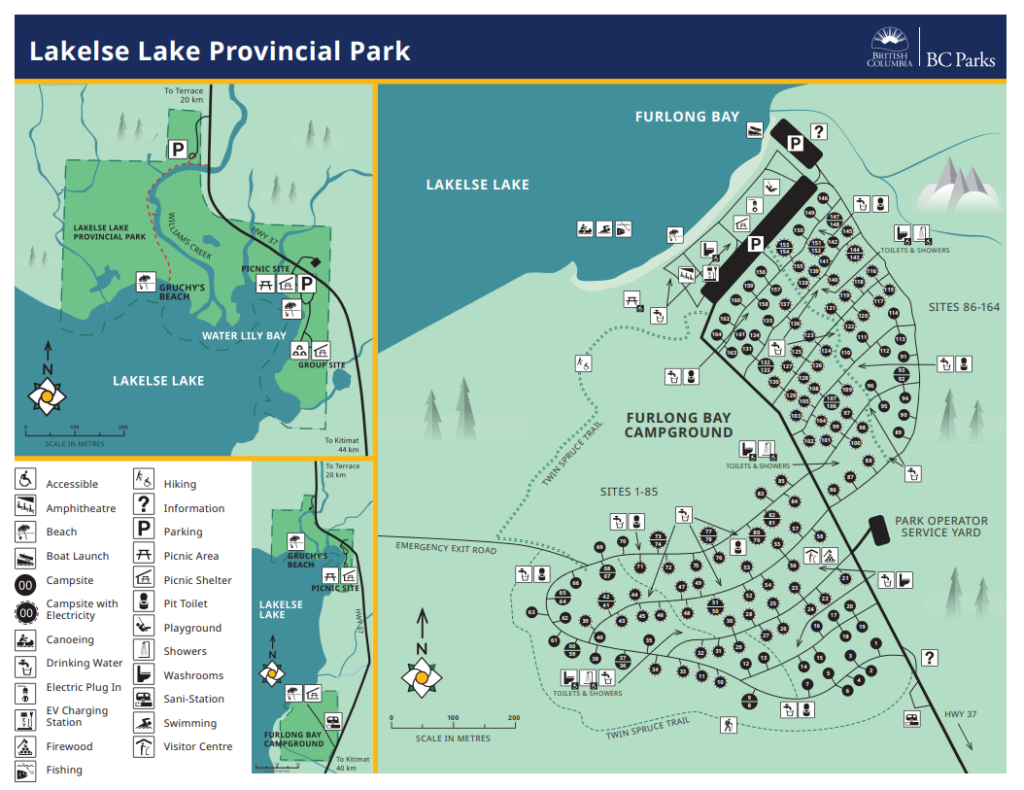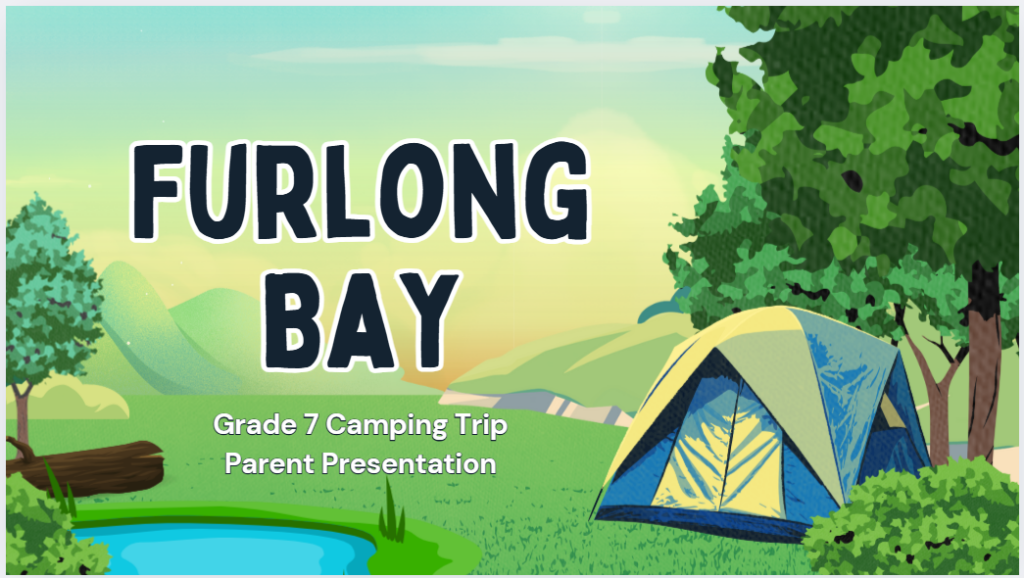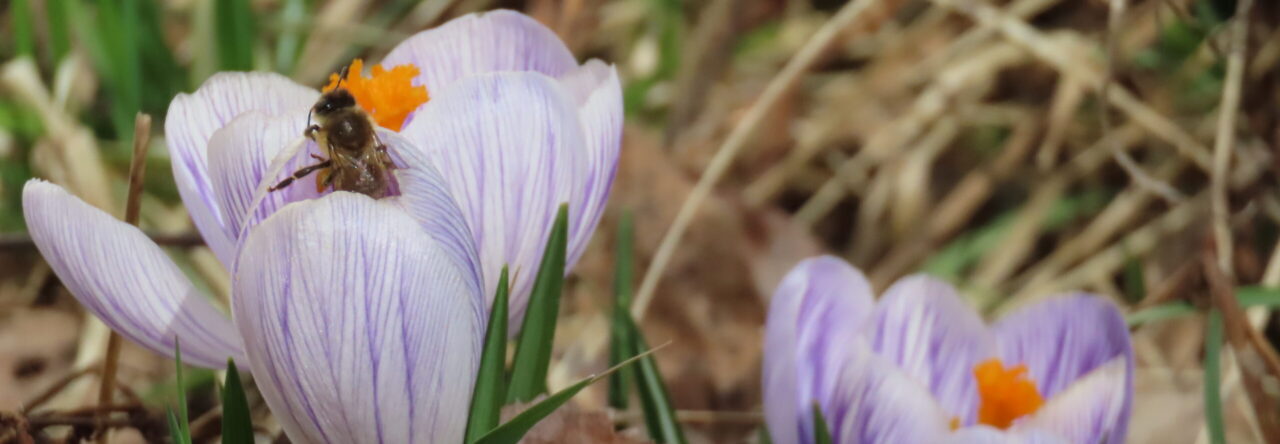Overview
This camping trip proposal is planned with a grade 7 class in mind. It includes activities such as dragon boating, hiking, compass use, knot tying, tarpology, plant and animal track identification and swimming. It also includes daily reading and a lesson about salmon and climate change, which meets criteria of the grade 7 science curriculum. It’s planned for a 5-day school week around the end of May or the first half of June when the weather in the Terrace area is generally nice and relatively warm.
The location for this excursion is Furlong Bay campground. Benefits of this location include:
- reduced environmental impact for a large group
- toilets and shower facilities
- access to walking and hiking trails
- playground at the beach
- picnic area shelter for a gathering space
- campfire rings
- forest amphitheatre for lessons
- 20 minutes from town with full vehicle access
- cellphone reception for emergency communication

Transportation to and from the campground will be by the school owned bus. An additional chaperone vehicle will be used for transporting gear.
Trip Objectives
- Increase student appreciation and respect for nature through experiential learning.
- Develop students’ outdoor and camping skills to increase safety of future excursions.
- Expand students’ repertoire of outdoor activities to increase likelihood of engaging in outdoor activities as adults.
- Develop students’ awareness and understanding of the impacts of climate change.
Skills to be Taught
Students will develop the following skills over the course of the camping trip:
- Knot tying and tarpology
- Compass navigation skills
- Fire building
- Plant identification and knowledge of usage (Example: thimbleberries)
- Animal track identification
- Camping food preparation
- 7 Leave No Trace principles
- Paddling in a dragon boat

Daily Itinerary
An overview of the 5 day excursion can be found below with the details in the drop down sections.
Day 1: Monday
- Travel to Furlong Bay Campgrounds at Lakelse Lake via our school’s bus
- Set up campsites and tents
- Furlong walking trail
- Colour wheel scavenger hunt
Detailed Itinerary
| 8:55-9:30 | Attendance; Gear check |
| 9:30-10:00 | Load gear on bus and truck |
| 10:00-10:15 | Final attendance and depart school |
| 10:15-10:45 | Travel to Furlong Bay Campground |
| 10:45-11:00 | Land Acknowledgement |
| 11:00-12:30 | Locate, assign, and setup campsites including tents |
| 12:30-1:15 | Meet at picnic shelter by beach and eat packed lunches; Check in about set up |
| 1:15-1:30 | Walk back to campsites, drop off lunch related items, and assemble for group walk |
| 1:30-2:30 | Walk Furlong Bay Campground Loop trail (approximately 1 hr) |
| 2:30-2:45 | Snack break |
| 2:45-3:30 | Colour wheel scavenger hunt – Guide students in dividing a blank sheet of paper to make a colour wheel with primary, secondary, and tertiary colours – To be completed on their own – Distribute crayons or pencil crayons for students to colour things they find that match the colours (3-4 per colour) |
| 3:30-4:30 | Free-time including beach area and campsites. Students can play on the playground at the beach or wade into the water if it’s hot, but this is not the designated swim time. An adult will be at each area. |
| 4:30-6:30 | Prep, eat, and cleanup dinner (see meal plan for menu). Students not assigned to help can have free time. |
| 6:30-7:30 | Smores and hanging out by the fires Reflect on how the day went |
| 7:30-8:30 | Games such as cards, Uno, checkers, chess, spoons, Jenga, charades, etc. at the campsites |
| 8:30-9:00 | Students get ready for bed. Lights out and in tents by 9. |
Day 2: Tuesday
- Skeena Wild presentation in forest amphitheatre (Climate Change and Skeena Salmon)
- Compass navigation lesson
- Nature mandalas
- Knot tying and tarpology lesson
Detailed Itinerary
| 7:30-9:30 | Wake up and breakfast. Students not assigned to help make breakfast have the option to sleep a bit longer. Clean up finished by 9:30. |
| 9:30-10:00 | Individually reading novels outside |
| 10:00-11:30 | Compass Navigation lesson |
| 11:30-12:00 | Free time around beach and playground |
| 12:00-1:00 | Lunch prep, eat, and cleanup |
| 1:00-2:00 | Skeena Wild presentation in forest amphitheatre: Climate Change and Skeena Salmon |
| 2:00-2:15 | Snack break |
| 2:15-3:00 | Group nature mandalas – Students will work in groups to create a pattern on the ground using rocks, leaves, small sticks, and other naturally occurring things around the campsites. – Students look at the mandalas made by the other groups at the end. |
| 3:00-4:00 | Knot tying and tarpology lesson at the picnic shelter – Students will learn how to tie bowline bends and trucker’s hitch knots in order to build tarp shelters with their group. |
| 4:00-5:00 | Free time around beach and campsites |
| 5:00-7:00 | Prep, eat, and cleanup dinner. Students not assigned to help can have free time. |
| 7:00-8:30 | Games such as cards, Uno, checkers, chess, spoons, Jenga, charades, etc. at the campsites |
| 8:30-9:00 | Students get ready for bed. Lights out and in tents by 9. |
Day 3: Wednesday
- Dragon boating (from boat launch) with Lakelse Dragon Boat Society
- Animal tracks lesson and hunt
- Read aloud and discussion of The Animal People Choose a Leader short story by Richard Wagamese
Detailed Itinerary
| 7:30-9:30 | Wake up and breakfast. Students not assigned to help make breakfast have the option to sleep a bit longer. Clean up finished by 9:30. |
| 9:30-10:00 | Individually reading novels outside |
| 10:00-11:30 | Animal tracks lesson and search – Discuss characteristics of different tracks that are likely to be seen in the area. – Students explore the campground in groups (keeping in mind Leave No Trace principles) to look for tracks – Sketch animal tracks that are found – Return to amphitheatre after allotted time to compare results. |
| 11:30-1:00 | Free time around beach and playground while lunch is being made. Then eat and cleanup. |
| 1:00-4:00 | Dragon boating from Furlong Bay dock – Depending on class size, the whole class should fit in the boat. If not, turns will be taken (holds about 22). – Lakelse Dragon Boat Society provides gear and guides. |
| 4:00-4:30 | Debrief and reflection on boating experience, focusing on the group aspect |
| 4:30-6:30 | Free time and dinner prep including campfire making and burning down to coals. Eat dinner. |
| 6:30-7:15 | Read aloud and discussion of The Animal People Choose a Leader short story by Richard Wagamese. Students can make and enjoy dessert over the campfire while silently listening to the story. |
| 7:15-8:30 | Games such as cards, Uno, checkers, chess, spoons, Jenga, charades, etc. at the campsites |
| 8:30-9:00 | Students get ready for bed. Lights out and in tents by 9. |
Day 4: Thursday
- Gunsight hike to waterfall (walk from campground and not the full hiking trail); eat lunch at waterfall
- Swimming at Furlong (Optional: paddle board rental)
- Plant ID and usage lesson
Detailed Itinerary
| 7:30-9:30 | Wake up and breakfast. Students not assigned to help make breakfast have the option to sleep a bit longer. Clean up breakfast and set up lunch making station |
| 9:30-10:00 | Students make and pack their own lunch sandwiches. Clean up stations. |
| 10:00-10:45 | Plant ID and usage lesson with guidance from our school’s Indigenous Support Worker |
| 10:45-11:00 | Get ready for hike and group up (ensure students have appropriate gear) |
| 11:00-12:00 | Hike from campsites to the highway (approx. 1.5 kms), safely cross highway to trail head, and hike to the waterfall up the Gunsight Lake hiking trail (approx. 2.5 kms from trailhead to waterfall with 235m elevation gain) |
| 12:00-12:30 | Lunch at waterfall. Ensure area is clean before leaving. |
| 12:30-1:30 | Hike back down and return to campsites |
| 1:30-2:00 | Relax at campsites |
| 2:00-4:00 | Swimming with lifeguard on duty. Optional: Furlong bay rents out paddle boards. Depending on cost, a couple could be rented for students to try out. |
| 4:00-4:30 | Individually reading novels outside |
| 4:30-5:30 | Free time |
| 5:30-7:30 | Prep, eat, and cleanup dinner. Students not assigned to help can have free time. |
| 7:30-8:30 | Make crispy smores treat as a group then eat it. Simultaneously play games at campsites. |
| 8:30-9:00 | Students get ready for bed. Lights out and in tents by 9. |
Day 5: Friday
- Cleanup camp sites
- Furlong walking trail
- Return to school for dismissal time (3:19) to accommodate bus students.
Detailed Itinerary
| 7:30-9:30 | Wake up and breakfast. Students not assigned to help make breakfast have the option to sleep a bit longer. Clean up finished by 9:30. |
| 9:30-10:00 | Individually reading novels outside |
| 10:00-11:00 | Pack up gear and take down tents. |
| 11:00-12:00 | Walk Furlong Bay Campground Loop trail (approximately 1 hr) in opposite direction from first day |
| 12:00-1:00 | Prep, eat, and cleanup lunch |
| 1:00-1:45 | Get everything together, final checks of campsites, and load bus when it arrives. |
| 1:45-2:15 | Bus ride back to school |
| 2:15-2:45 | Unload bus and truck. Return items borrowed from school. |
| 2:45-3:19 | Reflection circle and dismissal |
Meal Plan
| Day 1 | Breakfast: Eat before arriving at school Lunch: Bring packed from home Dinner: Pot roast with potatoes and vegetables over the fire Dessert: Smores |
| Day 2 | Breakfast: Bacon and egg breakfast sandwiches over the fire Lunch: Grilled cheese sandwiches with veggies (propane stove) Dinner: Camping tacos in a bag (no dessert this night) (propane stove) |
| Day 3 | Breakfast: Pancakes with fresh fruit (propane stove) Lunch: Pasta salad (made ahead) with raw veggies Dinner: Hot dogs/smokies over the fire Dessert: Banana boats and campfire popcorn |
| Day 4 | Breakfast: Bacon and egg burritos (propane stove) Lunch: Make and pack sandwiches to take on hike Dinner: Chicken thighs, Dutch oven mac and cheese, and raw veggies over the fire Dessert: Crispy Smores Treat (sheet smores) |
| Day 5 | Breakfast: French toast with fresh fruit (propane stove) Lunch: Leftovers Dinner: Eat at home |
- Groups of students will be pre-assigned prep and clean up for each meal throughout the week. Every student will participate multiple times. Students will learn to make campfires during their meal prep time.
- Students not assign can either choose to help or have free time at the beach area or campsites, as long as an adult is near.
- Prep includes making a fire or two (assuming there isn’t a fire ban) and burning it down to coals for cooking, depending on the meal. Some meals will use the propane stove.
- Fires will be in the fire rings by the picnic shelter at the beach or at one or two of the campsites.
- As per BC Park guidlines, bundles of firewood will be purchased from the park operator.
- Propane camping BBQ grill will be used exclusively if there is a fire ban.
Estimated Costs
| Bus: Skeena Middle School owns a class-sized bus so there is no cost for transportation | $0 |
| Lakelse Dragon Boat group rate | $100 |
| Propane | $50 |
| Firewood: From park operator (about $12 per bundle x 4) | $48 |
| Food: 11 meals plus snacks for approximately 30 people | $1000 |
| Water: drinking water taps are located throughout the campground and students will bring their own water bottles | $0 |
| Campground fees x 4 sites (7 students plus one adult = 8 person max) ($28+$7 for electrified sites) x 4 sites = 140 per night x 4 nights = $560 | $560 |
| Total estimated costs: | $1758 |
| Divided by 24 students (or actual class size) | $73.25 |
| Rounded up total fees for students | $75 |
Teacher Preparation
These tasks are to be completed in advance of the camping trip:
- Book campsites
- Book our school bus with office
- Arrange parent volunteers
- Arrange Skeena Wild workshop
- Arrange dragon boating with Lakelse Dragon Boat Society
- Arrange plant lesson with Indigenous Support Worker
- Grocery shopping and plan storage of perishable items
- Pre-teach the 7 Leave No Trace principles
- Prepare printouts of info sheets that are needed
- Submit field trip proposal to school principal
- Have students complete and return field trip forms
- Prepare schedule for students to help with meals
- Decide which students will share campsites
- Find out which families have tents that could be used and figure out how many are needed per site
- Discuss all expectations with students
- Make a backup plan for students that won’t be participating (Ideally, this isn’t needed)
Student Preparation
Students must complete these tasks in order to participate in the camping trip:
• Return completed field trip form before due date
• Pack gear as per student packing list
Gear to pack
The below checklists have be made based on the planned activities and the 10 Essentials for Outdoor Excursions.
First People Principles of Learning
Learning ultimately supports the well-being of the self, the family, the community, the land, the spirits, and the ancestors.
Spending time outdoors has many health benefits that support the self. Developing outdoor skills can lead to encouraging others to spend more time outdoors, supporting the family. Respecting nature (Leave No Trace principles) helps the land and the community by reducing environmental impacts and pollution.
Learning is holistic, reflexive, reflective, experiential, and relational (focused on connectedness, on reciprocal relationships, and a sense of place).
This trip incorporates many activities that engage students in experiential learning, focused on connecting with the land and developing relationships with classmates. These include the colour wheel scavenger hunt, learning about animal tracks and plant identification and usage, spending time on the water while dragon boating, and exploring the area while walking and hiking.
Learning involves recognizing the consequences of one‘s actions.
Actions have immediate consequences for the planned activities, such as dragon boating, swimming, and building campfires. Actions that put oneself or others in danger will not be tolerated and, therefore, will have consequences.
Learning involves generational roles and responsibilities.
As grade 7 students are at an age were they are becoming more responsible, they will be responsible for the majority of the meal preparation and cleanup, with guidance from the teacher or volunteer chaperones.
Learning recognizes the role of Indigenous knowledge.
Respect of Indigenous knowledge and perspectives is vital to reconciliation and closely tied to nature. Indigenous knowledge is weaved into this camping trip through the plant identification and usage lesson and the short story read aloud of The Animal People Choose a Leader by Richard Wagamese.
Learning is embedded in memory, history, and story.
Memory, history, and story are relied on for learning throughout this trip. Additionally, students will be making their own memories as they learn through experience.
Learning involves patience and time.
The gradual learning and practice of outdoor skills emphasize the importance of patience and time for successful learning.
Risk Assessment
Please refer to the below PDF for a full assessment of risks involved with this excursion:
Parent Presentation
Please click the below image to view the parent presentation:

